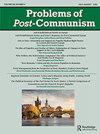The Formation of Religious Authority Among Central Asian Mullahs in Russia: Questions of Duty and Loyalty in a Muslim Migration Context
IF 2
2区 社会学
Q2 POLITICAL SCIENCE
引用次数: 0
Abstract
ABSTRACTThis paper develops a new approach to contemporary religious authority among Muslim migrants in Russia, conceptualizing such notions as duty and loyalty in the Muslim migration context. The study demonstrates the fluidity of the boundary between official and unofficial authorities using the configuration of the Muslim environment of Irkutsk (Siberia) as its real-life example. The research focuses on the position, religious practices, and views of Central Asian mullahs in the city of Irkutsk. Though they do not hold any official positions in the city mosque, they nevertheless play a considerable role in the construction of the religious everyday life of their fellow believers. AcknowledgmentsThis article is a product of a research project implemented as part of the Basic Research Program at the National Research University Higher School of Economics (HSE University) in 2022. The research was completed with additional support from the Orient-Institut Istanbul. The paper was translated from Russian into English by Ben McGarr.I would like to thank my colleagues who read different versions of this paper, attentively listened to me at various conferences, and gave their precious and useful advices. They are Sergei Abashin, Ekaterina Demintseva, Nikolai Ssorin-Chaikov, Jesko Schmoller, Danis Garaev, Kristina Kovalskaya, Anna Kruglova, Anna Cieślewska, and Guzel Sabirova. I would also like to express my gratitude to all my interlocutors in Irkutsk and beyond who contributed their time, thoughts, and emotions.Disclosure StatementNo potential conflict of interest was reported by the author(s).Notes1. The Spiritual Directorate of the Muslims of Irkutsk Oblast, or “Baikalskii Muftiyat” (named after Asia’s largest lake, Baikal, located on the border between Irkutsk Oblast and the Republic of Buryatia), under the leadership of Farit – the Mufti and Imam of the Irkutsk Cathedral Mosque – was officially registered in 2006. The Baikal Muftiate was formed on the basis of the liquidated Baikal territorial subdivision (qadiyat/qazyat) of the Spiritual Directorate of Muslims of the Asian Part of Russia (abbreviated DUM AChR in Russian). One of the largest Muslim organizations in Russia, the Spiritual Directorate of Muslims of the Asian Part of Russia was founded in 1997 under the leadership of Mufti Nafigulla Ashirov (Yemelianova Citation2022, 139). The process by which the Baikal Qazyat of the Muslims of Irkutsk Oblast separated from the DUM AChR (and the corresponding change of name) took place during 2005 and was prompted by a split in the congregation of the Irkutsk Cathedral Mosque, an attempt by a number of community activists to remove Farit Mingaleyev, the imam of the Irkutsk Mosque and simultaneously head of the Baikal Qazyat. In the confrontation between the two parties, the regional authorities took the side of the current Imam Farit. The Baikal Muftiate is now an independent regional organization, not subject to any of the all-Russian Muslim structures, including the Russian Council of Muftis (SMR).2. Imam Farit (born 1959), a Tatar, was born into a peasant family from Bashkortostan who had been dispossessed and exiled to Siberia’s Irkutsk Oblast. He worked as an engineer through the 1980s and ‘90s, only coming to Islam in adult life. In 1996–1997 he studied at Kazan’s Mukhammadiya madrasah. Since 2006 he has served as Mufti of the Baikal Muftiate. As imam, he is respected by many parishioners, despite many of them also noting his insufficient knowledge of Islam, proximity to the regional authorities, his excessive workload, and, accordingly, his inability to adequately carry out his duties as imam.3. Friday prayers. Jumu’ah-namaz is the term commonly used in Russian for the collective Friday prayer (Ṣalāt al-Jumuʿah). The term is composed of the Arabic jumu’ah and Persian namaz.4. In order to protect the anonymity of my informants, I do not give their names here, nor do I consider it necessary in this case to use pseudonyms.Additional informationFundingThis work was supported by the Orient-Institut Istanbul; Basic Research Program at the National Research University Higher School of Economics.俄罗斯中亚毛拉宗教权威的形成:穆斯林移民背景下的责任与忠诚问题
摘要本文对俄罗斯穆斯林移民中的当代宗教权威进行了新的研究,在穆斯林移民语境中对义务和忠诚等概念进行了概念化。该研究以伊尔库茨克(西伯利亚)穆斯林环境的配置作为其现实生活的例子,展示了官方和非官方当局之间边界的流动性。这项研究的重点是伊尔库茨克市中亚毛拉的地位、宗教习俗和观点。虽然他们在城市清真寺没有任何官方职位,但他们在信众日常宗教生活的建设中发挥了相当大的作用。本文是国家研究型大学高等经济学院(HSE大学)在2022年基础研究计划中实施的一个研究项目的产物。这项研究是在伊斯坦布尔东方研究所的额外支持下完成的。这篇论文由本·麦克加尔(Ben McGarr)从俄语翻译成英语。我要感谢我的同事们,他们阅读了本文的不同版本,在各种会议上认真听取了我的意见,并提出了宝贵而有用的建议。他们是Sergei Abashin, Ekaterina Demintseva, Nikolai Ssorin-Chaikov, Jesko Schmoller, Danis Garaev, Kristina Kovalskaya, Anna Kruglova, Anna Cieślewska和Guzel Sabirova。我还要感谢所有在伊尔库茨克和其他地方与我对话的人,他们贡献了他们的时间、思想和情感。披露声明作者未报告潜在的利益冲突。伊尔库茨克州穆斯林精神理事会,或“Baikalskii Muftiyat”(以亚洲最大的湖泊贝加尔湖命名,位于伊尔库茨克州和布里亚特共和国之间的边界),在Farit的领导下-伊尔库茨克大教堂清真寺的穆夫提和伊尔库茨克大教堂的伊玛目-于2006年正式注册。贝加尔湖mutiate是在俄罗斯亚洲部分穆斯林精神理事会(俄语缩写为DUM AChR)清算的贝加尔湖领土分支(qadiyat/qazyat)的基础上形成的。俄罗斯最大的穆斯林组织之一,俄罗斯亚洲部分穆斯林精神理事会成立于1997年,由穆夫提Nafigulla Ashirov领导(Yemelianova Citation2022, 139)。2005年,伊尔库茨克州的贝加尔湖穆斯林教团从DUM AChR中分离出来(以及相应的名称变更),起因是伊尔库茨克大教堂清真寺的集会分裂,一些社区活动人士试图罢免伊尔库茨克清真寺的伊尔库茨克清真寺的伊玛目兼贝加尔湖教团的负责人Farit Mingaleyev。在双方的对抗中,地区当局站在了现任伊玛目法里特一边。贝加尔湖穆夫提现在是一个独立的区域组织,不受包括俄罗斯穆夫提理事会(SMR)在内的任何全俄罗斯穆斯林结构的支配。伊玛目法里特(生于1959年),鞑靼人,出生于巴什科尔托斯坦的一个农民家庭,他们被剥夺了财产,流放到西伯利亚的伊尔库茨克州。上世纪八九十年代,他一直是一名工程师,直到成年后才皈依伊斯兰教。1996-1997年,他在喀山的穆克玛迪亚宗教学校学习。自2006年以来,他一直担任贝加尔湖穆夫提。作为伊玛目,他受到许多教区居民的尊敬,尽管他们中的许多人也注意到他对伊斯兰教的了解不足,与地区当局关系密切,工作量过大,因此他无法充分履行伊玛目的职责。周五的祈祷。Jumu 'ah-namaz是俄语中通常用于集体星期五祈祷的术语(Ṣalāt al-Jumu - ah)。这个词是由阿拉伯语jumu 'ah和波斯语namaz3组成的。为了保护我的线人的匿名性,我在这里没有给出他们的名字,我也不认为在这种情况下有必要使用假名。本研究得到了伊斯坦布尔东方研究所的支持;国立研究型大学高等经济学院基础研究项目。
本文章由计算机程序翻译,如有差异,请以英文原文为准。
求助全文
约1分钟内获得全文
求助全文
来源期刊

Problems of Post-Communism
POLITICAL SCIENCE-
CiteScore
4.00
自引率
12.50%
发文量
33
期刊介绍:
The post-communist countries are the most rapidly changing societies of Europe and Asia. For insight into this twenty-first century revolution, there is no better source than Problems of Post-Communism. Emphasis is placed on timely research covering current economic, political, security, and international developments and trends in Russia and China, Central Europe and Central Asia, Latin America, and Southeast Asia. Clarity and readability make the articles fully accessible to researchers, policy makers, and students alike.
 求助内容:
求助内容: 应助结果提醒方式:
应助结果提醒方式:


